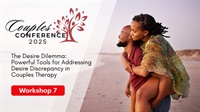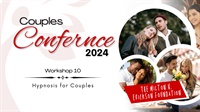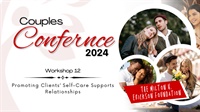- Average Rating:
- Not yet rated
- Topic Areas:
- Keynotes
- Categories:
- Couples Conference | Couples Conference 2025
- Faculty:
- Lilian Borges, MA, LPC
- Course Levels:
- Master Degree or Higher in Health-Related Field
- Duration:
- 56:42
- Format:
- Audio and Video
- Original Program Date:
- May 04, 2025
- Short Description:
- Hypnosis is often viewed as a mysterious, external practice, but it is, in fact, deeply woven into the fabric of psychotherapy—particularly in couples therapy. Trance states, which allow individuals to shift perspective, process emotions, and experience deep healing, are integral to many therapeutic approaches, from psychoanalysis to family systems. Whether consciously recognized or not, couples therapists are already utilizing hypnotic tools in their work. This keynote will illuminate how hypnosis plays a vital role in enhancing couples therapy, deepening emotional understanding, and breaking through stuck relational patterns. By becoming more attuned to the hypnotic elements present in therapeutic work, therapists can sharpen their skills and provide even more profound and impactful treatment for their clients.
- Price:
- $59.00 - Base Price
- Average Rating:
- Not yet rated
- Topic Areas:
- Keynotes
- Categories:
- Couples Conference | Couples Conference 2025
- Faculty:
- William Doherty, PhD
- Course Levels:
- Master Degree or Higher in Health-Related Field
- Duration:
- 1:00:15
- Format:
- Audio and Video
- Original Program Date:
- May 04, 2025
- Short Description:
- Politically mixed couples face special challenges during a time of political polarization, and even couples who vote similarly may have conflict over how strongly they feel about the current political environment and how to deal with extended family differences over politics. This is new territory for couples therapists, complicated by the fact that many of us have strong political convictions. This presentation will cover sources of today’s polarization, special assessment issue for couples in conflict over politics, and tools for helping them buffer their relationships against these political stressors and engage in constructive coping. The presenter will also discuss how he has adapted couple therapy principles in designing workshops that bring “reds” and “blues” together through the national nonprofit Braver Angels.
- Price:
- $59.00 - Base Price
- Average Rating:
- Not yet rated
- Topic Areas:
- Topical Panels
- Categories:
- Couples Conference | Couples Conference 2025
- Faculty:
- Terry Real, LICSW | Rebecca Jorgensen | William Marsh, Psy.D.
- Course Levels:
- Master Degree or Higher in Health-Related Field
- Duration:
- 1:00:34
- Format:
- Audio and Video
- Original Program Date:
- May 04, 2025
- Short Description:
- This panel explores the complexities of relational trauma within couples therapy, examining how past attachment wounds, betrayal, and unresolved trauma impact intimate relationships. Experts will discuss therapeutic approaches for identifying trauma-related dynamics, fostering emotional safety, and promoting healing within couples. The session will integrate insights from attachment theory, neurobiology, and evidence-based interventions, offering clinicians practical strategies to navigate trauma-informed therapy with couples.
- Price:
- $59.00 - Base Price
- Average Rating:
- Not yet rated
- Topic Areas:
- Workshops
- Categories:
- Couples Conference | Couples Conference 2025
- Faculty:
- Lilian Borges, MA, LPC
- Course Levels:
- Master Degree or Higher in Health-Related Field
- Duration:
- 2:02:05
- Format:
- Audio and Video
- Original Program Date:
- May 04, 2025
- Short Description:
- In couples therapy, it’s not uncommon for therapists to find that one partner may need to explore their personal issues separately to facilitate healing within the relationship. Referrals for individual work can sometimes feel complicated, but when used strategically, they can be a powerful tool for enhancing the couple’s therapy journey. This workshop dives into the art of working with a partner individually while maintaining a focus on their relationship dynamics. We’ll explore the attachment framework to help clients understand their attachment styles, reduce defenses, and build empathy for their partner’s needs. Together, we’ll discuss why and when individual therapy is appropriate, how to ensure it aligns with couples therapy, and how to handle the potential challenges and ethical considerations that come with individual sessions.
- Price:
- $59.00 - Base Price
- Average Rating:
- Not yet rated
- Topic Areas:
- Workshops
- Categories:
- Couples Conference | Couples Conference 2025
- Faculty:
- William Doherty, PhD
- Course Levels:
- Master Degree or Higher in Health-Related Field
- Duration:
- 2:01:01
- Format:
- Audio and Video
- Original Program Date:
- May 04, 2025
- Short Description:
- Many couples therapists treat individuals with troubled marriages when the spouse will not participate in couples therapy. Often the therapy has started out as individual work and then serious relationship complaints surface. But we lack explicit models for helping these individuals, and it’s all too easy to start colluding with the client against the partner who’s absent from the room—a stance that’s counterproductive to improving the relationship and helping the client learn from its difficulties. The challenge is to maintain a systemic, relational perspective even when we are seeing only one partner. This workshop will provide specific tools and guidelines for helping individual clients in the context of their relationship.
- Price:
- $59.00 - Base Price
- Average Rating:
- Not yet rated
- Topic Areas:
- Workshops
- Categories:
- Couples Conference | Couples Conference 2025
- Faculty:
- William Marsh, Psy.D.
- Course Levels:
- Master Degree or Higher in Health-Related Field
- Duration:
- 1:59:21
- Format:
- Audio and Video
- Original Program Date:
- May 04, 2025
- Short Description:
- This course will describe key factors in emotional well-being and orienting participants toward opportunities for experiential activities that lead toward a therapeutic goal. A unique perspective will be taken through exploring the impact of social determinants of health and minority stress on relational dynamics, and how to navigate this in therapy. Various theoretical frameworks will be utilized to conceptualize cases and integrate interventions into practice.
- Price:
- $59.00 - Base Price
- Average Rating:
- Not yet rated
- Topic Areas:
- Keynotes
- Categories:
- Couples Conference | Couples Conference 2025
- Faculty:
- Martha Kauppi, MS MFT
- Course Levels:
- Master Degree or Higher in Health-Related Field
- Duration:
- 1:01:27
- Format:
- Audio and Video
- Original Program Date:
- May 03, 2025
- Short Description:
- This keynote session will delve into the complex world of sexual desire, exploring why discrepant desire is such a challenging issue for clients and therapists alike, and providing a comprehensive systemic framework for understanding and addressing it. Attendees will be offered a practical and innovative tool for parsing complex and interconnected factors, providing a deeper understanding that will reshape your approach to one of the most pervasive and complicated relational sex issues.
- Price:
- $59.00 - Base Price
- Average Rating:
- Not yet rated
- Topic Areas:
- Keynotes
- Categories:
- Couples Conference | Couples Conference 2025
- Faculty:
- Terry Real, LICSW
- Course Levels:
- Master Degree or Higher in Health-Related Field
- Duration:
- 1:00:55
- Format:
- Audio and Video
- Original Program Date:
- May 03, 2025
- Short Description:
- Leading men, women and non-binary people into true intimacy is synonymous with leading them beyond patriarchy. Traditional gender roles were never built for intimacy, but for stability. For example, the traditional term masculinity MEANS invulnerability—the more invulnerable you are the more manly you are and visa versa. Yet, you cannot be intimate and invulnerable at the same time. Leading men into intimacy means nothing less than reconfiguring who they are as men. Traditionally women and partners of men are socialized to over accommodate and resent. More modern women and partners have been taught to speak up with individual empowerment, but rarely with ‘relational empowerment.’ RLT (Relational Life Therapy) teaches people to stand up for themselves and love and cherish their partner in the same breath. “Loving power” also goes beyond the morays of patriarchy, we therapists are intimacy merchants. Our work is at once therapeutic and social activism.
- Price:
- $59.00 - Base Price
- Average Rating:
- Not yet rated
- Topic Areas:
- Workshops
- Categories:
- Couples Conference | Couples Conference 2025
- Faculty:
- Martha Kauppi, MS MFT
- Course Levels:
- Master Degree or Higher in Health-Related Field
- Duration:
- 1:59:54
- Format:
- Audio and Video
- Original Program Date:
- May 03, 2025
- Short Description:
- Are you finding it challenging to make progress with couples experiencing mismatched libidos? This in-depth workshop will equip you with powerful techniques to simultaneously engage and constructively challenge both the lower and higher desire partners. Learn to explore common inhibiting factors affecting sexual desire, identify and avoid typical therapeutic pitfalls, and learn effective first-session strategies to lay a strong foundation for treatment. Observe video demonstrations of pivotal therapeutic moments and discover methods to establish personalized, meaningful goals for each partner.
- Price:
- $59.00 - Base Price
- Average Rating:
- Not yet rated
- Topic Areas:
- Workshops
- Categories:
- Couples Conference | Couples Conference 2025
- Faculty:
- Tammy Nelson, PhD
- Course Levels:
- Master Degree or Higher in Health-Related Field
- Duration:
- 2:02:03
- Format:
- Audio and Video
- Original Program Date:
- May 03, 2025
- Short Description:
- In this cutting edge training we will discuss the varieties of affairs and the many ways that relationships can heal from the betrayal that affects intimacy. We will review the stages of recovery that lead to long term healing. Issues around trust, forgiveness, new visions of monogamy, sexuality and connection for the future of the couple’s relationship will be addressed. We will review three phases of treatment and the steps of the recovery process. It is crucial to understand the triangulation that can occur when therapists do not explore their own bias and countertransference and we will look at how to avoid unintentional shaming and client retaliation. We will look at the power of the third in the relationship, including the therapeutic as well as the romantic.
- Price:
- $59.00 - Base Price
- Average Rating:
- Not yet rated
- Topic Areas:
- Workshops
- Categories:
- Couples Conference | Couples Conference 2025
- Faculty:
- Terry Real, LICSW
- Course Levels:
- Master Degree or Higher in Health-Related Field
- Duration:
- 1:56:30
- Format:
- Audio and Video
- Original Program Date:
- May 03, 2025
- Short Description:
- RLT (Relational Life Therapy) has three phases. One is waking up the clients (joining through the truth). Two is doing deep trauma work in the presence of the partner. And, three is relationship skill building. It is a combination of all three of these phases together that produces the quick profound transformational change RLT is known for. This workshop will give therapists a new map to give to their clients—how to think relationally along with the beginnings of a new tool set for example ‘how to speak up for yourself with love’, how to handle a disgruntled partner, and others. I’ll share with you a new vision of how to live relationally and nuts and bolts concrete practices to achieve it.
- Price:
- $59.00 - Base Price
- Average Rating:
- Not yet rated
- Topic Areas:
- Topical Panels
- Categories:
- Couples Conference | Couples Conference 2025
- Faculty:
- Martha Kauppi, MS MFT | Rick Miller, MSW | Tammy Nelson, PhD
- Course Levels:
- Master Degree or Higher in Health-Related Field
- Duration:
- 58:43
- Format:
- Audio and Video
- Original Program Date:
- May 03, 2025
- Short Description:
- Couples therapists have more conversations and treatment options than before, including discussions about relationship structures as well as sexuality. Participants will have the opportunity to hear about different approaches to couples therapy and relationship structures and ask any questions they may have.
- Price:
- $59.00 - Base Price
- Average Rating:
- Not yet rated
- Topic Areas:
- Topical Panels
- Categories:
- Couples Conference | Couples Conference 2025
- Faculty:
- Elliott Connie, MA, LPC | Lilian Borges, MA, LPC | William Doherty, PhD | Ari Tuckman, PsyD
- Course Levels:
- Master Degree or Higher in Health-Related Field
- Duration:
- 59:45
- Format:
- Audio and Video
- Original Program Date:
- May 03, 2025
- Short Description:
- It’s said that the truth shall set you free, so why do romantic partners lie to each other? Or to their therapist? And how important are the facts anyway in couples therapy? Actual or perceived dishonesty can wreak havoc on a relationship and can stall therapeutic progress. Most couples therapists don’t want to get bogged down on fact checking, but sometimes the details do matter–perhaps to the other partner, perhaps as revealing about the individual speaking, and perhaps as revealing about the couple’s dynamic.
- Price:
- $59.00 - Base Price
- Average Rating:
- Not yet rated
- Topic Areas:
- Keynotes
- Categories:
- Couples Conference | Couples Conference 2025
- Faculty:
- Elliott Connie, MA, LPC
- Course Levels:
- Master Degree or Higher in Health-Related Field
- Duration:
- 58:55
- Format:
- Audio and Video
- Original Program Date:
- May 02, 2025
- Short Description:
- The word “Solution” in the title of the Solution Focused Approach. The key tenant of this way of working actually has nothing to do with solutions, it has everything to do with hope. Just as when working with individual clients, working with couples means we have to use skillfully crafted questions that move the couple from despair to a hoped for future. As the couple answers these questions they come back together in deep and meaningful ways that will last. In this lecture the presenter will share the keys to asking the kinds of questions that consistently produce positive results for couples.
- Price:
- $59.00 - Base Price
- Average Rating:
- Not yet rated
- Topic Areas:
- Keynotes
- Categories:
- Couples Conference | Couples Conference 2025
- Faculty:
- Rick Miller, MSW
- Course Levels:
- Master Degree or Higher in Health-Related Field
- Duration:
- 57:39
- Format:
- Audio and Video
- Original Program Date:
- May 02, 2025
- Short Description:
- For decades, many male couples have successfully navigated open relationships. But it’s been done quietly, and the mental health and couples fields have only recently begun addressing models of consensual non-monogamy. Join Rick Miller, LICSW during this keynote as he discusses his work with male couples who have navigated the terrain of open relationships in the context of couples therapy. He will provide guidelines for success and failure, including his model in which couples incorporate honest communication, and modes for assessing how the model is working and what can shift. He will provide videos of a couple who have struggled with honesty and fears, yet found a way to strengthen their joint intimacy by incorporating individual needs. Attendees are encouraged to step out of their own comfort zones to consider appreciating and supporting a consensual non-monogamy model with couples wishing to explore their options.
- Price:
- $59.00 - Base Price
- Average Rating:
- Not yet rated
- Topic Areas:
- Workshops
- Categories:
- Couples Conference | Couples Conference 2025
- Faculty:
- Elliott Connie, MA, LPC
- Course Levels:
- Master Degree or Higher in Health-Related Field
- Duration:
- 2:01:25
- Format:
- Audio and Video
- Original Program Date:
- May 02, 2025
- Short Description:
- This presentation will provide an overview of Solution Building Couples Therapy (SBCT). The presenter will introduce the Diamond Approach to SBCT and will provide detailed explanations of each step of the Diamond Approach. Participants will see real examples of actual couples engaged in SBCT. Participants will engage in in-depth discussions about how to conceptualize cases from this perspective.
- Price:
- $59.00 - Base Price
- Average Rating:
- Not yet rated
- Topic Areas:
- Workshops
- Categories:
- Couples Conference | Couples Conference 2025
- Faculty:
- Tammy Nelson, PhD
- Course Levels:
- Master Degree or Higher in Health-Related Field
- Duration:
- 2:01:00
- Format:
- Audio and Video
- Original Program Date:
- May 02, 2025
- Short Description:
- Modern relationships today take many forms, therapists can be a crucial part of helping clients create them intentionally, with a focus on honesty, transparency and equality. What all these relationship choices have in common is the dilemma of personal and relational integrity. How do couples negotiate commitment, keep their promises, and find their personal sexual freedom at the same time? This workshop looks at contemporary relationships and helps clinicians guide couples to create sustainable and flexible monogamy agreements that contribute positively to relational change.
- Price:
- $59.00 - Base Price
CC25 Workshop 03 - Here We Go Again: Why Do Couples Keep Having the Same Fights? - Ari Tuckman, PsyD
- Average Rating:
- Not yet rated
- Topic Areas:
- Workshops
- Categories:
- Couples Conference | Couples Conference 2025
- Faculty:
- Ari Tuckman, PsyD
- Course Levels:
- Master Degree or Higher in Health-Related Field
- Duration:
- 2:01:31
- Format:
- Audio and Video
- Original Program Date:
- May 02, 2025
- Short Description:
- Couples usually get stuck on the same topics and feel frustrated that they keep running around the same unsatisfying circles. This could be the big three (parenting, sex, and money) or it could be other topics. They come to couples therapy hoping to break out of these ruts—and fearful that they can’t. Often, they expect the therapist will explain to their partner why they need to make most of the changes and why the first partner is right about what they’re asking. This sets up the therapy to be just as stuck. Avoiding this trap requires the therapist to stay away from problem-solving and to instead focus on teaching the necessary skills for the partners to tolerate their differences—to focus more on the process of their disagreements than the content.
- Price:
- $59.00 - Base Price
- Average Rating:
- Not yet rated
- Topic Areas:
- Workshops
- Categories:
- Couples Conference | Couples Conference 2025
- Faculty:
- Lilian Borges, MA, LPC
- Course Levels:
- Master Degree or Higher in Health-Related Field
- Duration:
- 2:06:22
- Format:
- Audio and Video
- Original Program Date:
- May 02, 2025
- Short Description:
- In relationships, couples often find themselves trapped in unhealthy patterns—emotions, behaviors, and dynamics that feel almost impossible to escape. These recurring negative patterns can be thought of as “bad trances,” unconscious states that influence how partners interact with one another. Just as a trance limits an individual’s ability to break free from automatic thoughts and actions, these relational trances prevent couples from making meaningful changes in their interactions. In this workshop, you’ll learn how to identify and break these negative trances using key insights from hypnosis, allowing couples to build healthier, more conscious connections. No prior hypnosis knowledge is required—this workshop will give you practical, easy-to-implement strategies to help couples reset their dynamics and foster positive change.
- Price:
- $59.00 - Base Price
- Average Rating:
- Not yet rated
- Topic Areas:
- Workshops
- Categories:
- Couples Conference | Couples Conference 2025
- Faculty:
- Rick Miller, MSW
- Course Levels:
- Master Degree or Higher in Health-Related Field
- Duration:
- 1:51:30
- Format:
- Audio and Video
- Original Program Date:
- May 02, 2025
- Short Description:
- Male couples face challenges of being overly independent, and frequently come to couples therapy due to loneliness and feelings of betrayal based on awkward communication styles. Though each partner yearns for their intimate and emotional needs to be met by the other, many gay men lack these skills due to the secrecy and shame which are typical aspects of gay development. He will share a video of a couple who went from experiencing distance and questioning their relationship to achieving intimacy and connection through the couples work they did. This workshop will define how norms in the gay community encourage avoidance, and how male couples can benefit from learning how to communicate, hear, and nurture each other, enhancing secure functioning. Clinicians will feel confident with existing modalities for treating couples and will be able to adapt these skills to successfully treat male couples.
- Price:
- $59.00 - Base Price
- Average Rating:
- Not yet rated
- Topic Areas:
- Workshops
- Categories:
- Couples Conference | Couples Conference 2025
- Faculty:
- Rebecca Jorgensen
- Course Levels:
- Master Degree or Higher in Health-Related Field
- Duration:
- 1:52:30
- Format:
- Audio and Video
- Original Program Date:
- May 02, 2025
- Short Description:
- EFT is a structured, experiential model of couple therapy, rooted in adult attachment theory, that helps partners move from conflict, distance and distress to increased openness, trust and deeper emotional engagement; from an insecure to a secure and enduring attachment bond. The effectiveness of EFT is strongly supported by over 30 years of respected outcome research, with success rates of up to 70%, and a growing body of process research that helps identify the most impactful interventions that help create lasting change. Most therapists see couples and many lack a clear, empirically supported treatment model that increases effectiveness. This introductory presentation provides new and experienced therapists the theory and essential practice elements for working with emotion as used with diverse populations and presenting issues.
- Price:
- $59.00 - Base Price
- Average Rating:
- Not yet rated
- Topic Areas:
- Workshops
- Bundle(s):
- 2024 Couples Conference Bundle
- Categories:
- Couples Conference | Couples Conference 2024
- Faculty:
- Lilian Borges, MA, LPC
- Course Levels:
- Master Degree or Higher in Health-Related Field
- Duration:
- 2:00:39
- Format:
- Audio and Video
- Original Program Date:
- May 05, 2024
- Short Description:
- Hypnosis is a powerful tool for change and when used in couples therapy it can connect couples with their internal resources, teach them co-regulation, and help create secure bonding. This workshop will teach simple and impactful techniques that you’ll be able to use right away with your couples to empower them to change and make therapy session memorable. No previous experience with hypnosis is necessary.
- Price:
- $59.00 - Base Price
- Average Rating:
- Not yet rated
- Topic Areas:
- Workshops
- Bundle(s):
- 2024 Couples Conference Bundle
- Categories:
- Couples Conference | Couples Conference 2024
- Course Levels:
- Master Degree or Higher in Health-Related Field
- Duration:
- 1:21:29
- Format:
- Audio and Video
- Original Program Date:
- May 05, 2024
- Short Description:
- Talking is the most dangerous thing most people do, and listening is the most infrequent. Participants in this workshop will learn that “how” we talk, not “what” we talk about is the source of all human conflict. And they will learn a new way of talking without criticism, listening without judgment, and connecting beyond difference that will be transformative in all aspects of their lives, including how they do couple’s therapy.
- Price:
- $59.00 - Base Price
- Average Rating:
- Not yet rated
- Topic Areas:
- Workshops
- Bundle(s):
- 2024 Couples Conference Bundle
- Categories:
- Couples Conference | Couples Conference 2024
- Faculty:
- Ari Tuckman, PsyD
- Course Levels:
- Master Degree or Higher in Health-Related Field
- Duration:
- 2:00:51
- Format:
- Audio and Video
- Original Program Date:
- May 05, 2024
- Short Description:
- Stressed out, burned out couples don’t have the time or energy to take care of themselves, let alone to nurture their relationship. They come to couples therapy, but then say they’re too busy when they don’t apply what is discussed in session. They’re cutting corners on sleep, diet, and exercise and thereby have less cognitive and emotional bandwidth, including for their partner. They’re more irritable with each other, less patient, and less tolerant of differences. They can easily fall into a zero-sum tug of war where both partners hope for more support from the other, but neither has it to give, furthering the discontent with each other. Everyone knows the obvious good advice on sleep, diet, and exercise, yet then doesn’t always do it. What does this poor self-care reveal about the individual or the relationship? What are the deeper individual and relationship dynamics that interfere with this self-care?
- Price:
- $59.00 - Base Price
- Average Rating:
- Not yet rated
- Topic Areas:
- Topical Panels | Transference Focused Psychotherapy (TFP)
- Bundle(s):
- 2024 Couples Conference Bundle
- Categories:
- Couples Conference | Couples Conference 2024 | Pioneers in Couples and Family Therapy
- Faculty:
- Stan Tatkin, PsyD, MFT | Ari Tuckman, PsyD
- Course Levels:
- Master Degree or Higher in Health-Related Field
- Duration:
- 56:43
- Format:
- Audio and Video
- Original Program Date:
- May 05, 2024
- Short Description:
- This panel explores the painful aftermath of betrayal and the challenge of proving trustworthiness after infidelity. Clinicians examine lingering doubt, repeated violations, and the difficulty of rebuilding trust when past promises were broken. Emphasizing transparency, mutual effort, and shared vision, the discussion offers both conceptual models and practical tools to support therapists working at the edges of relational repair.
- Price:
- $59.00 - Base Price


























